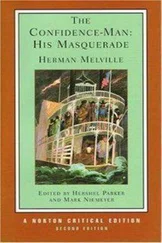Oh! for a refreshing glimpse of one blade of grass—for a snuff at the fragrance of a handful of the loamy earth! Is there nothing fresh around us? Is there no green thing to be seen? Yes, the inside of our bulwarks is painted green; but what a vile and sickly hue it is, as if nothing bearing even the semblance of verdure could flourish this weary way from land. Even the bark that once clung to the wood we use for fuel has been gnawed off and devoured by the captain’s pig; and so long ago, too, that the pig himself has in turn been devoured.
There is but one solitary tenant in the chicken-coop, once a gay and dapper young cock, bearing him so bravely among the coy hens.
But look at him now; there he stands, moping all the day long on that everlasting one leg of his. He turns with disgust from the mouldy corn before him, and the brackish water in his little trough. He mourns no doubt his lost companions, literally snatched from him one by one, and never seen again. But his days of mourning will be few for Mungo, our black cook, told me yesterday that the word had at last gone forth, and poor Pedro’s fate was sealed. His attenuated body will be laid out upon the captain’s table next Sunday, and long before night will be buried with all the usual ceremonies beneath that worthy individual’s vest. Who would believe that there could be any one so cruel as to long for the decapitation of the luckless Pedro; yet the sailors pray every minute, selfish fellows, that the miserable fowl may be brought to his end. They say the captain will never point the ship for the land so long as he has in anticipation a mess of fresh meat. This unhappy bird can alone furnish it; and when he is once devoured, the captain will come to his senses. I wish thee no harm, Pedro; but as thou art doomed, sooner or later, to meet the fate of all thy race; and if putting a period to thy existence is to be the signal for our deliverance, why—truth to speak—I wish thy throat cut this very moment; for, oh! how I wish to see the living earth again! The old ship herself longs to look out upon the land from her hawse-holes once more, and Jack Lewis said right the other day when the captain found fault with his steering.
‘Why d’ye see, Captain Vangs,’ says bold Jack, ‘I’m as good a helmsman as ever put hand to spoke; but none of us can steer the old lady now. We can’t keep her full and bye, sir; watch her ever so close, she will fall off and then, sir, when I put the helm down so gently, and try like to coax her to the work, she won’t take it kindly, but will fall round off again; and it’s all because she knows the land is under the lee, sir, and she won’t go any more to windward.’ Aye, and why should she, Jack? didn’t every one of her stout timbers grow on shore, and hasn’t she sensibilities; as well as we?
Poor old ship! Her very looks denote her desires! how deplorably she appears! The paint on her sides, burnt up by the scorching sun, is puffed out and cracked. See the weeds she trails along with her, and what an unsightly bunch of those horrid barnacles has formed about her stern-piece; and every time she rises on a sea, she shows her copper torn away, or hanging in jagged strips.
Poor old ship! I say again: for six months she has been rolling and pitching about, never for one moment at rest. But courage, old lass, I hope to see thee soon within a biscuit’s toss of the merry land, riding snugly at anchor in some green cove, and sheltered from the boisterous winds.
‘Hurra, my lads! It’s a settled thing; next week we shape our course to the Marquesas!’ The Marquesas! What strange visions of outlandish things does the very name spirit up! Naked houris—cannibal banquets—groves of cocoanut—coral reefs—tattooed chiefs—and bamboo temples; sunny valleys planted with bread-fruit-trees—carved canoes dancing on the flashing blue waters—savage woodlands guarded by horrible idols—HEATHENISH RITES AND HUMAN SACRIFICES.
Such were the strangely jumbled anticipations that haunted me during our passage from the cruising ground. I felt an irresistible curiosity to see those islands which the olden voyagers had so glowingly described.
The group for which we were now steering (although among the earliest of European discoveries in the South Seas, having been first visited in the year 1595) still continues to be tenanted by beings as strange and barbarous as ever. The missionaries sent on a heavenly errand, had sailed by their lovely shores, and had abandoned them to their idols of wood and stone. How interesting the circumstances under which they were discovered! In the watery path of Mendanna, cruising in quest of some region of gold, these isles had sprung up like a scene of enchantment, and for a moment the Spaniard believed his bright dream was realized.
In honour of the Marquess de Mendoza, then viceroy of Peru—under whose auspices the navigator sailed—he bestowed upon them the name which denoted the rank of his patron, and gave to the world on his return a vague and magnificent account of their beauty. But these islands, undisturbed for years, relapsed into their previous obscurity; and it is only recently that anything has been known concerning them. Once in the course of a half century, to be sure, some adventurous rover would break in upon their peaceful repose, and astonished at the unusual scene, would be almost tempted to claim the merit of a new discovery.
Of this interesting group, but little account has ever been given, if we except the slight mention made of them in the sketches of South-Sea voyages. Cook, in his repeated circumnavigations of the globe, barely touched at their shores; and all that we know about them is from a few general narratives.
Among these, there are two that claim particular notice. Porter’s ‘Journal of the Cruise of the U.S. frigate Essex, in the Pacific, during the late War’, is said to contain some interesting particulars concerning the islanders. This is a work, however, which I have never happened to meet with; and Stewart, the chaplain of the American sloop of war Vincennes, has likewise devoted a portion of his book, entitled ‘A Visit to the South Seas’, to the same subject.
Within the last few, years American and English vessels engaged in the extensive whale fisheries of the Pacific have occasionally, when short of provisions, put into the commodious harbour which there is in one of the islands; but a fear of the natives, founded on the recollection of the dreadful fate which many white men have received at their hands, has deterred their crews from intermixing with the population sufficiently to gain any insight into their peculiar customs and manners.
The Protestant Missions appear to have despaired of reclaiming these islands from heathenism. The usage they have in every case received from the natives has been such as to intimidate the boldest of their number. Ellis, in his ‘Polynesian Researches’, gives some interesting accounts of the abortive attempts made by the ‘’Tahiti Mission’’ to establish a branch Mission upon certain islands of the group. A short time before my visit to the Marquesas, a somewhat amusing incident took place in connection with these efforts, which I cannot avoid relating.
An intrepid missionary, undaunted by the ill-success that had attended all previous endeavours to conciliate the savages, and believing much in the efficacy of female influence, introduced among them his young and beautiful wife, the first white woman who had ever visited their shores. The islanders at first gazed in mute admiration at so unusual a prodigy, and seemed inclined to regard it as some new divinity. But after a short time, becoming familiar with its charming aspect, and jealous of the folds which encircled its form, they sought to pierce the sacred veil of calico in which it was enshrined, and in the gratification of their curiosity so far overstepped the limits of good breeding, as deeply to offend the lady’s sense of decorum. Her sex once ascertained, their idolatry was changed into contempt and there was no end to the contumely showered upon her by the savages, who were exasperated at the deception which they conceived had been practised upon them. To the horror of her affectionate spouse, she was stripped of her garments, and given to understand that she could no longer carry on her deceits with impunity. The gentle dame was not sufficiently evangelical to endure this, and, fearful of further improprieties, she forced her husband to relinquish his undertaking, and together they returned to Tahiti.
Читать дальше












